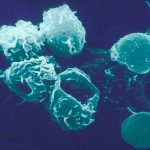Link to Pubmed [PMID] – 32330290
Link to DOI – 10.1002/eji.202048615
Eur. J. Immunol. 2020 Jun; 50(6): 779-782
In the past 15 years, it became clear that the symbiotic microbiota has an important impact on the development and regulation of the immune system. Consequently, it is incorrect to interpret a phenotype solely as a direct result of the genotype, without considering the impact of the microbiota. In fact, ignorance of the effects exerted by the microbiota may account for a large part of the “replication issues” found in many studies. In this issue of the European Journal of Immunology, Beller et al. [Eur. J. Immunol. 2020. 50: 783-794] provide data suggesting that eosinophils are not required to maintain IgA-producing plasma cells in the intestine, contrary to earlier reports. This paper shows that mice lacking eosinophils develop an altered intestinal microbiota, which poorly induces IgA. Normal levels of IgA were obtained in mice lacking eosinophils when these were colonized by microbiota from the WT mice. Therefore, the use of littermate controls carrying the same microbiota, in experiments comparing WT and mutant mice, is necessary to control the potential role of the microbiota. Nevertheless, caution should always be exercised in the interpretation of the results: changes in the microbiota may result from mutations in the host, and thereby, indirectly convey the effect of genotypes on phenotypes.



